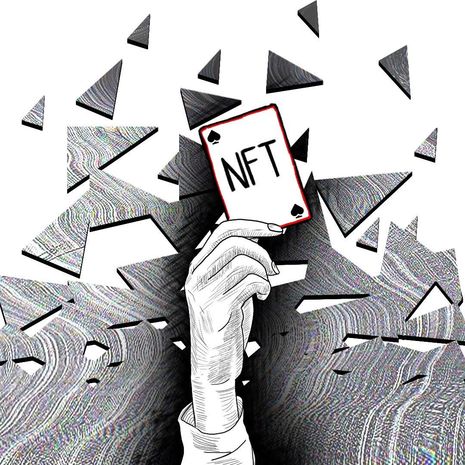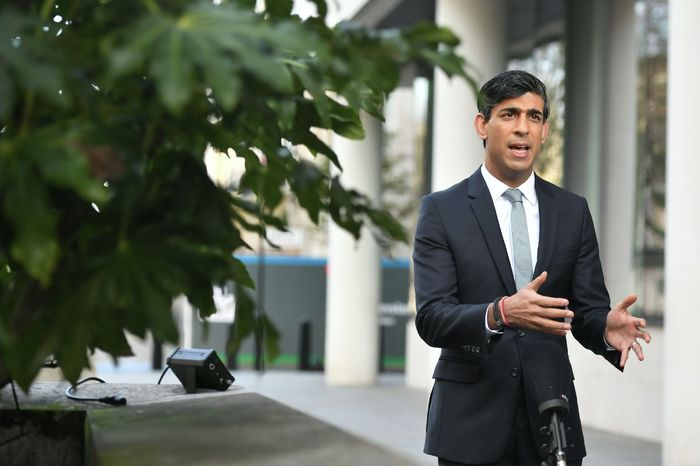Why you should be paying attention to NFTs
Tilly Palmer explains how Non-Fungible Tokens work, and their implications for art and the environment

The first ever tweet was sold this week for $2.9m. Christie’s has auctioned graphic designer Beeple’s art for $69m. Grimes just made $6m selling digital artwork and Elon Musk has released a song about NFTs as an NFT. The lovechild of the art and technology worlds that’s worth a lot of coin has finally reached adolescence – and it has the chance of being seriously big.
Non-Fungible Tokens (NFTs) are essentially unique digital tokens that can be bought and sold. They can be created by anyone through the medium of a blockchain like Ethereum to produce an organic cryptocurrency. This happens via making a “Smart Contract”, a programme that enables you to attach a file such as a jpeg or mp4 to it, so that the blockchain supports the file. You can then create value for the token by linking it to your digital file and now you have a digital token to either sell on or own.
An example of how this works is the trading of domain names. They’re created through the platform of the internet and you buy them mostly through a few different trading websites, the same way NFTs can be created via different forms of cryptocurrency. Once you buy one, you are the only person who has ownership of that web address.
The obvious drawback to the idea of owning a piece of online content is the ability for people to share and adapt it, but the selling point lies in the individuality and scarcity. NFTs are like designer handbags; you can buy as many fakes as you like but that doesn’t make them the real authentic version. Now imagine that concept with only one original handbag. These are “verified” by digital certificates that act as official receipts. Following Musk’s lyrical explanation: “[c]omputers never sleep. It’s verified, it’s guaranteed.”
Despite being around since 2015, NFTs have only recently gained hype through celebrity connections and exclusivity. For instance, Logan Paul offered fans the chance to win first edition packs of Pokémon cards if they bought his NFT collectible card, ahead of his upcoming fight with Floyd Mayweather. NFT trading sites like OpenSea are seeing surges in views in what has been labelled a “gold rush”. But is this just speculative mania which will see an inevitable bubble burst as high-powered people try to cash in on intangible items?
“Whether you love them or hate them, fancy buying one or uploading your own music and artwork – NFTs are certainly making waves.”
While in some ways, over inflation of value is how the art world has always done business, NFTs may also open up new opportunities for smaller artists. One of the benefits to NFTs is continued royalties, so despite value going up as artwork or music is resold, a percentage from each sale always goes back to the creator. For the music industry particularly, we could start to envision a world without the money grabbing middlemen of corporate labels, where artists make the majority share from sales. It’s also a potentially life changing mechanism for content creators who dabble in meme culture for example, to monetise creative outlets that were probably deemed as a “waste of time” by their parents. All hail a new generation of digitalised, monetised comedy.
Since the recent GameStop incident, when the underdogs of the stock market took on Wall Street, there is a definite counterculture emerging in the finance and technology fields which may see its thirst quenched through outlets like these. Some big names have used NFT sales for philanthropy – Jack Dorsey converted his tweet money to bitcoin and has pledged it to Give Directly’s Africa Response Fund.
Some people on the other hand haven’t missed their opportunity to make fun of what some will inevitably see as ludicrous. A recent artwork was minted by “The unnamed artist John Cleese” who may or may not be (though seemingly is) the man himself. He is auctioning a poorly drawn iPad drawing of the Brooklyn Bridge, aiming to bring in $69m for it. Currently, the highest bid stands at $50,000. Speaking to Vanity Fair, Cleese said that “the world has gone terminally insane”. What he will do with the earnings is unknown, but it certainly highlights the potential for NFTs to be a short-lived, big-name fuelled craze. It may be, as Musk so aptly puts it, “for your Vanity”.
Perhaps this is for the best and there is more to Cleese’s “terminal” quip than first thought. Emerging research has identified extreme levels of carbon emissions associated with blockchain transactions, particularly those relating to the Proof of Work certificates. Each PoW transaction can use more energy than the average US household does in one day. However, Ethereum, unlike many other cryptocurrencies, has pledged to do better. “That’s just a huge waste of resources, even if you don’t believe that pollution and carbon dioxide are an issue. There are real consumers – real people – whose need for electricity is being displaced by this stuff,” said Vitalik Buterin, the creator of Ethereum. Since 2019, the cryptocurrency has been moving to significantly reduce carbon emissions.
Whether you love them or hate them, fancy buying one or uploading your own music and artwork – NFTs are certainly making waves. Many are watching eagle-eyed for the lucrative opportunities, or impending doom, that may befall a concept very much in its adolescence. It’s worth staying tuned.
 News / Colleges charge different rents for the same Castle Street accommodation2 March 2026
News / Colleges charge different rents for the same Castle Street accommodation2 March 2026 News / News in Brief: waterworks, wine woes, and workplace wins 1 March 2026
News / News in Brief: waterworks, wine woes, and workplace wins 1 March 2026 News / Angela Merkel among Cambridge honorary degree nominees27 February 2026
News / Angela Merkel among Cambridge honorary degree nominees27 February 2026 News / Climate activists protest for ‘ethical careers policy’1 March 2026
News / Climate activists protest for ‘ethical careers policy’1 March 2026 News / King’s hosts open iftar for Ramadan3 March 2026
News / King’s hosts open iftar for Ramadan3 March 2026









